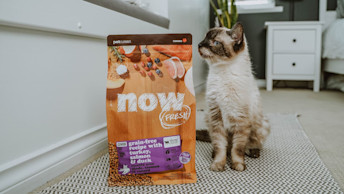August 17, 2022
A Guide to Feeding Your Senior Cat

Is your feline friend starting to show some grey hairs? Are you worried about supporting them as they get older? If so, you've come to the right place. When it comes to feeding your senior cat, you need to understand when to start, what kind of food to get, and more. Your senior cat deserves more than the average pet. In fact, the nutrition that you give your senior animal could elongate their life, which means more time to make memories with them.
To learn more about senior cat food, keep reading or watch this quick summary video. We offer everything you need to know!
When Should You Switch to Senior Cat Food?
According to International Cat Care, senior cats are between the ages of 11 years and 14 years old. When they reach an age above 14 years, they're considered super-senior cats.
Cats are living longer and longer with improvements in veterinary knowledge and technology. Luckily, the cat food that we choose for our senior animals makes a difference, too. Proper nutrition and diet play a crucial role in helping your senior cat live to a much older age.
What Are the Nutritional Requirements for Senior Cats?
Even though your senior pet may still be the cute furball on the outside, it’s important that they remain healthy on the inside. Senior cats need more nutrients than adult cats because their bodies need more nutritional support. Therefore, you may see senior-specific formulas in the pet food aisle. Senior pets shouldn't be eating the same food as your other adult cats.
Investing in senior pet recipes with quality ingredients can help you maintain your senior cat's health in multiple ways:
Benefits of switching to a senior recipe:
- They help cats maintain senior animal health
- They help cats reach and maintain a healthy body weight
- They help cats age well

To keep your feline friend healthy, you need to feed them food that has a balance of important nutrients, including vitamins, minerals, proteins, and fats. In addition, your cat should be intaking 11 of the 22 amino acids from its food. Since their body can't produce these amino acids, it's essential that they're present in their food.
Further, your senior cat's food should be different from any other animal's food. Cats have a few special food requirements, which include the following:
Senior cat food requirements:
- Protein
- Taurine
- Arginine
- Vitamin A
- Vitamin D
- Niacin
- Arachidonic acid
In order to give your senior cat the best nutrition, you need to make sure that their food has all of these components. Without them, your cat may feel fatigued.
How Important Is Weight for Senior Animals?
No matter its age, your cat's weight matters. If they're too light or too heavy, it could have negative effects on their health and wellness. Your senior cat's diet plays a significant role in their weight management. That's why a proper diet is a must.
When you're choosing your cat's food, you must consider who your cat is. What is their environment and how do they interact with it? How old are they and what is their activity level like? There are different recipes for cats with different personalities. For example, a cat that is more active will need more nutrients than a cat that is less active.
The cat food recipes should also have a good balance of nutrients overall, such as L-carnitine to support healthy fat metabolism. Probiotics and pumpkin are also necessary to support healthy gut bacteria and good digestion.
How Can I Ensure Proper Hydration for My Senior Cat?
Unfortunately, cats aren't great at drinking enough water. That's why they're so prone to kidney issues. When they're in the wild, cats get most of their water intake from the prey that they catch and eat. When they're inside, they don't get as much hydration from their food, especially if they're eating hard food.
Adding wet food to their diet can help improve your cat's hydration and overall health. With improved hydration, your cat has the opportunity to be happier and healthier. Wet food is also great for senior cats in general. They tend to have weaker teeth, so eating hard food can be more difficult for them. If your cat has had any teeth extracted and has trouble eating, you should consider feeding wet food over dry food to make meal time easier for them.
Wet food is also easily digestible and great for picky eaters; With Now Fresh, there are so many different flavors for your cat to try, plus, they're minimally processed so that your cat can get the most nutrients out of the food that they're eating.
If you're thinking about moving your cat from dry to wet food, you should transition slowly. Try dividing your cat's food between wet and dry food. Then, you can slowly add more wet food and less dry food until they transition completely to 100% wet food. For a full guide on how to transition your cat to a new food, read our transition guide for cats.
Where Can You Find the Right Food for Feeding Your Senior Cat?
If you're looking for the perfect dry or wet food for your senior cat food, consider Now Fresh’s premium quality recipes, made with fresh meats & fish. Now Fresh's Senior Cat Food contains the necessary vitamins, minerals, and amino acids that your senior cat needs in its diet. This senior cat food also includes omega-3 and omega-6 fatty acids to help your cat develop a soft, shiny coat.
Find where to buy us in store or online today to get started. Feeding your senior cat the right way will make a huge difference.


